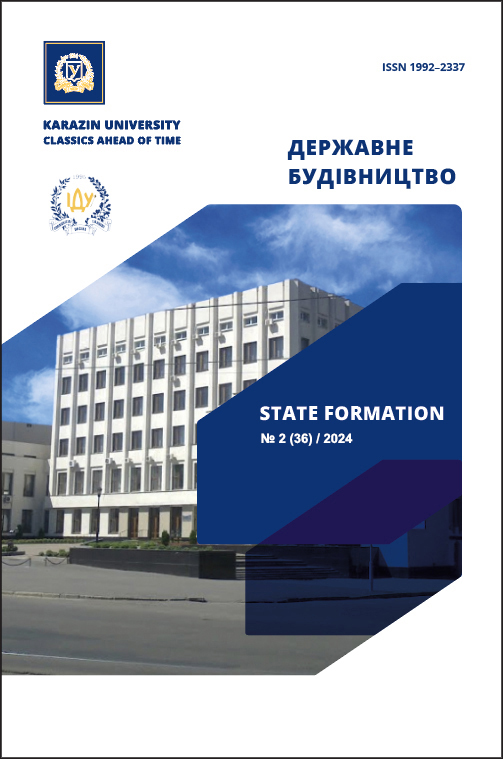Public Management of Intellectual Resources for National Security: What are the Prospects for the Idea of Regional Hubs of Expert Resources?
Abstract
The article explores the prospects for the development of regional hubs of expert resources in Ukraine as an innovative model for organizing public management of intellectual support for national security in the face of hybrid threats and geopolitical turbulence. The authors conduct a comparative analysis of global trends and models of decentralization of expert resources in the security sphere, highlighting key determinants and variability of approaches in different countries and regions of the world. Particular attention is paid to the experience of leading international security alliances and think tanks, such as NATO, AUKUS, and RAND Corporation, which develop adaptive networked ecosystems of expertise capable of rapidly mobilizing intelligence to respond to the complex challenges of our time. The authors investigate the principles and mechanisms of horizontal interaction in the formation of interregional expert communities, emphasizing the importance of shared values, trust, inclusiveness, and technological base. Based on the analysis of the role and models of functioning of local competence centers in different countries, the authors outline the potential and challenges of building a network of regional security hubs in Ukraine. In particular, the need to overcome structural constraints and anachronistic approaches to the organization of analytical work, ensure adequate resources and technological support, develop horizontal links and a culture of collaboration between the public, private, and civil society sectors is emphasized. The authors propose promising mechanisms for the expert community to influence security policy in the context of Russian aggression, including intensifying expert diplomacy, creating "coalitions of support" within the country, developing joint projects with partners from Central and Eastern European countries, and actively using public diplomacy and strategic communication tools. The conclusions emphasize that building an influential network of regional security hubs is a strategic task for Ukraine, which requires systematic investments in the development of analytical capabilities, cross-sectoral cooperation, and communication with society. The article has an interdisciplinary character at the intersection of national security, public administration, and network analysis, and will be of interest to scholars, experts, and practitioners dealing with the transformation of the security expertise system in the context of global challenges.
Downloads
References
National Institute for Strategic Studies. (2024). Analysis of national security threats in domestic policy. URL: http://surl.li/irjvjb [in Ukrainian].
Ukrainian Institute of the Future. (2024). Think tanks of Ukraine. URL: URL: https://www.slideshare.net/slideshow/2024-pdf-3571/268897564 [in Ukrainian].
Ukrainian Institute of the Future. (2024). 2024 - where is the point of certainty: UIF experts forecast. URL: URL: http://surl.li/tdfhrg [in Ukrainian].
Ukrainian Institute of the Future. (2024). 2024 - where is the point of certainty: UIF experts forecast. URL: http://surl.li/tdfhrg [in Ukrainian].
Tyshkevych, I. (2023). Scenarios for ending the war. Ukrainian Institute of the Future. URL: https://drive.google.com/file/d/1Nq0KIahlCeSN-sOCNA4Byqm5L2kzuUL5/view [in Ukrainian].
Center for Countering Disinformation. (2024). URL: https://cpd.gov.ua/kerivnycztvo/# [in Ukrainian].
Yakymenko, Y., & Rachok, A. (2021). Think tanks today and tomorrow: A view from Ukraine. Razumkov Centre. URL: https://razumkov.org.ua/statti/analitychni-tsentry-sogodni-i-zavtra-pogliad-z-ukrainy [in Ukrainian].
Chatfield, A., & Reddick, C. (2018). Smart inclusive governance in Australia. DOI: https://doi.org/10.1007/978-3-319-93459-8_3
Cohen, R. (2024). Ukraine needs a new storyline. RAND Corporation. URL: https://www.rand.org/pubs/commentary/2024/09/ukraine-needs-a-new-storyline.html
European Centre of Excellence for Countering Hybrid Threats. (2022). Ukraine joins Hybrid CoE. URL: https://www.hybridcoe.fi/news/ukraine-joins-hybrid-coe/
Getmanchuk, A. (2019). Military-technical cooperation of Ukraine. URL: https://niss.gov.ua/sites/default/files/2019-08/getmanchuk_0.pdf
Institute for National Security Studies. (2022). Strategic survey for Israel 2022-2023. URL: https://www.inss.org.il/publication/strategic-survey-for-israel-2022/
Jing, Y., & Osborne, S. (2020). Public-private partnerships in China. DOI: https://doi.org/10.1007/978-981-13-6371-6_10
Kramer, F. (n.d.). Free but secure trade: Priorities in support of national security. Atlantic Council. URL: https://www.atlanticcouncil.org/wp-content/uploads/2022/06/Free-but-Secure-Trade-Priorities-in-Support-of-National-Security.pdf
Lee, J., et al. (2021). Innovation ecosystems in South Korea. DOI: https://doi.org/10.3390/su13041701
McGann, A. (2020). Global go to think tank index report. URL: https://razumkov.org.ua/uploads/2020_Global_Go_To_Think_Tank_Index_Report.pdf
McGann, J. (2021). 2020 Global go to think tank index report. University of Pennsylvania. URL: https://repository.upenn.edu/cgi/viewcontent.cgi?article=1018&context=think_tanks
McGann, J.G. (2021). Global trends and transitions in think tanks, politics, and policy advice in the age of policy dilemmas and disruptions. In H. Wang & A. Michie (Eds.), Consensus or conflict? China and globalization. Springer. DOI: https://doi.org/10.1007/978-981-16-5391-9_17
Melnyk, O. (2021). Decentralization and inclusiveness as priorities for reform: Comparative analysis of security expertise organization models. National Security & Innovation Activities: Methodology, Policy and Practice, 2(4), 54-63. DOI: https://doi.org/10.52363/2414-5866/2021-2-4
Niblett, R. (2022). How the world has changed on my watch. Chatham House. URL: https://www.chathamhouse.org/publications/the-world-today/2022-06/how-world-has-changed-my-watch
Orrell, M., & Galgon, J. (2019). NATO and expert communities. DOI: https://doi.org/10.1080/13523260.2019.1676388
Pandey, Y. (n.d.). AUKUS and Australia’s strategic future: A deep dive into AUKUS and emerging technologies. URL: https://projectqsydney.com/aukus-and-australias-strategic-future-a-deep-dive-into-aukus-and-emerging-technologies/
Park, H.W., & Leydesdorff, L. (2019). Regional innovation systems in Japan. DOI: https://doi.org/10.1007/s11192-019-03224-7
Radin, A. (2017). Hybrid warfare in the Baltics: Threats and potential responses. RAND Corporation. URL: http://surl.li/omglod
Reeve, R., & Harris, C. (2020). Public-private security partnerships. RUSI. URL: https://rusi.org/explore-our-research/publications/rusi-journal/public-private-security-partnerships
Rich, M.D. (2016). The role of think tanks in modern governance: Remarks at the China Development Forum 2016. RAND Corporation. URL: https://www.rand.org/pubs/corporate_pubs/CP878.html
Sapuppo, M. (2024). Freezing the front lines in Ukraine would condemn millions to Russian occupation. Atlantic Council. URL: https://www.atlanticcouncil.org/blogs/ukrainealert/
freezing-the-front-lines-in-ukraine-would-condemn-millions-to-russian-occupation/
Slaughter, A.-M. (2017). The chessboard and the web. Yale University Press.
Sullivan, B. (2023). Will U.S. export regulations derail AUKUS? National Defense Magazine. URL: https://www.nationaldefensemagazine.org/articles/2023/3/10/will-us-export-regulations-derail-aukus
McGann, J. (Ed.). (2021). The future of think tanks and policy advice around the world. Palgrave Macmillan. URL: https://link.springer.com/book/10.1007/978-3-030-60379-3#about
Kramer, F.D., & Crouch, M.R. (2021). Transformative priorities for national defense. Atlantic Council. URL: https://www.atlanticcouncil.org/wp-content/uploads/2021/06/Transformative-
Priorities-Report-2021.pdf
Vogel, E., & DeWitt, J. (2018). Leveraging for national security. DOI: https://doi.org/10.1080/10803920.2018.1494375
Wallis, J., Conroy, E., & Stock, C. (2024). The United States as a ‘Pacific Nation’: Imaginary, performance, and spatialisation. Geopolitics, 1-34. DOI: https://doi.org/10.1080/14650045.2024.2302421
Xiang, J., et al. (2019). Collaborative governance in China. DOI: https://doi.org/10.1007/s11115-019-00447-3

